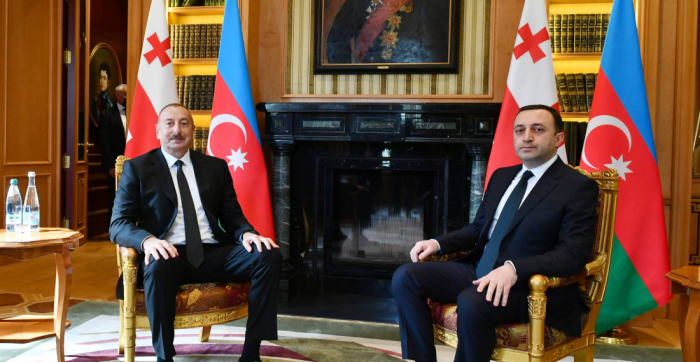Equally important is Azerbaijan’s clear denial of any fearmongering claims by certain political and expert circles, reaffirming that Baku has no plans for a military operation against Armenia in the Syunik (Zangazur) region of Armenia. The Azerbaijani government has reiterated its recognition of this region as part of Armenia. As a result, the two countries are now remarkably close to signing a peace treaty, and it is reasonable to assume this could happen in the near future, if not by the end of this year.
This situation implies that the South Caucasus holds significant potential for entering a new era characterized by greater stability and peaceful order. Unfortunately, there is also a list of risks that could undermine regional peace and security. The three countries in the region, namely Georgia, Armenia, and Azerbaijan, would need to take steps toward integration in order to counter these threats.
The region is at risk of becoming a theater for geopolitical rivalries.
One major security threat to the region is posed by the fallout from the Russia-Ukraine war. This war and its consequences do not determine only the future of Ukraine but also that of the wider region, in particular, the other former Soviet countries. In the context of the intensifying confrontation between the West and Russia, the states find themselves in-between the two camps and face security challenges.
Azerbaijan and Georgia try to avoid aligning with one side against the other in this conflict. This policy has served well to Baku’s efforts to eliminate the separatist regime in Karabakh which was manipulated by Russia against Azerbaijan for many decades. The fact that the Azerbaijani government succeeded to restore its territorial integrity without sacrificing its independence vis-à-vis Russia or any other big power was an accomplishment few would have thought to be possible. A similar foreign policy strategy seems to be employed by the Georgian government in the context of the geopolitical chaos in the wider region. Tbilisi’s endeavors to diversify its foreign policy by establishing stronger ties with China and refraining from an all-out confrontation with Russia bear a resemblance to Azerbaijan's well-recognized foreign policy strategy, commonly referred to as a “balanced approach in foreign policy.”
The policies of the Armenian government that could potentially result in a confrontation between Yerevan and Moscow diverge from those of Baku and Tbilisi, and these differences may have broader implications for the entire South Caucasus region. As often criticized by the Armenian experts, the government of the Prime Minister Nikol Pashinyan appears to be lacking a clear foreign policy strategy and often makes contradictory moves in relations with foreign powers. On the one hand, he publicly complains to the Europeans about Russia and expands the country’s relations with the West in different domains, including military; on the other hand seeks to protect Yerevan’s ties with Moscow apparently considering Armenia’s dependency on Russia in multiple areas including economy. Russia’s characterization of Pashinyan as the next “Zelensky” in reaction to his speech at the European Parliament on 17 October signals a further deterioration of the relations, with potentially negative impact on the whole region.
Can the three South Caucasus countries co-ordinate their coordinated foreign policy strategy?
In his appeal to Prime Minister Pashinyan on October 18, the imprisoned ex-president of Georgia Mikhail Saakashvili, encouraging the Armenian premier to grab the peace opportunity in the region stated that “After some time, we can live like three Baltic countries with open borders and create a whole system of logistic, financial, and energy hubs, using the advantages of each of our three.” The example of the Baltic countries is a good reference point to contemplate about the existing situation and future prospects of the South Caucasus.
Indeed, the three countries will have enormous potential for regional integration with many economic and social advantages if they can overcome existing disputes, primarily those between Armenia and Azerbaijan. However, along with this reconciliation and integration, they need also a common approach to the most pressing geopolitical and other challenges that threaten the overall peace and stability of the region. The three Baltic countries would not have been able to succeed in their integration had they pursued contradictory foreign policy strategies with their own agendas.
The recent initiatives taken by the leaders of Georgia and Azerbaijan for the convening of meetings involving the three regional nations in Tbilisi and the organization of future peace talks between Baku and Yerevan in the Georgian capital represent a promising step in this direction. The South Caucasus needs a cooperation and consultation platform of the three local countries and coordinated foreign policy approaches to produce joint solutions to their common challenges.
Vasif Huseynov, is a Senior Advisor at the Baku-based Center of Analysis of International Relations (AIR Center).
AzVision.az
More about:
















































